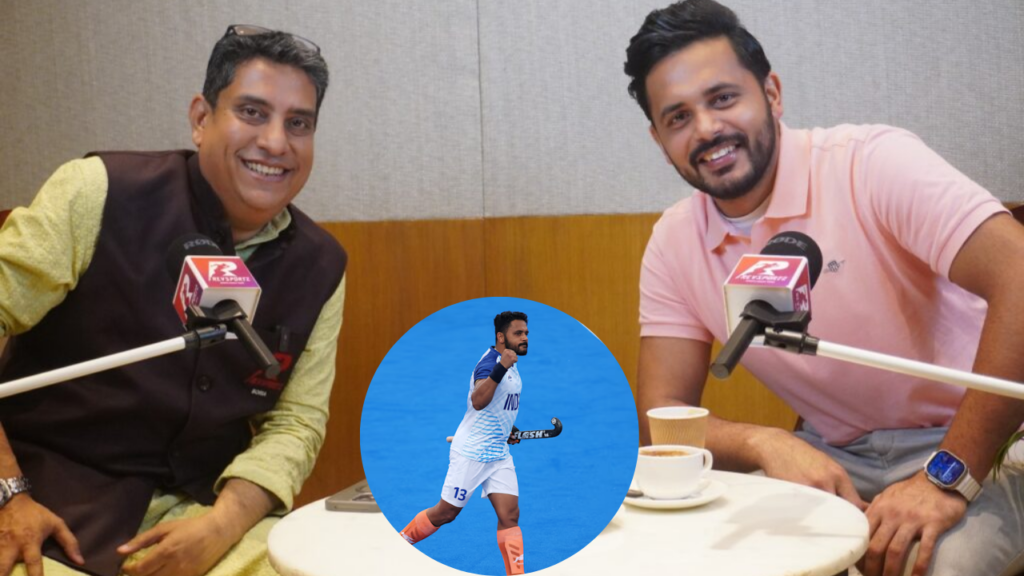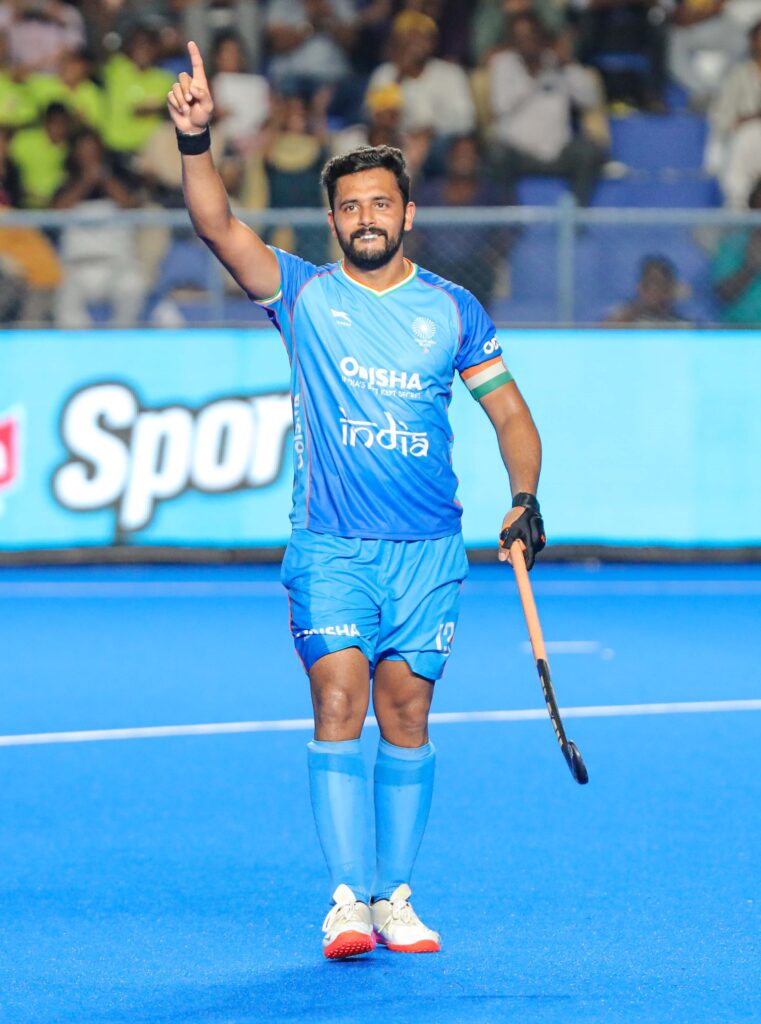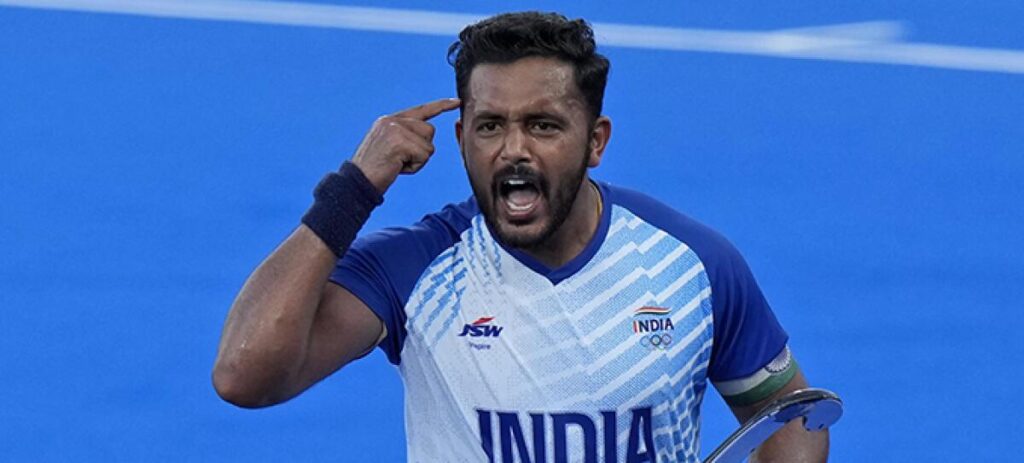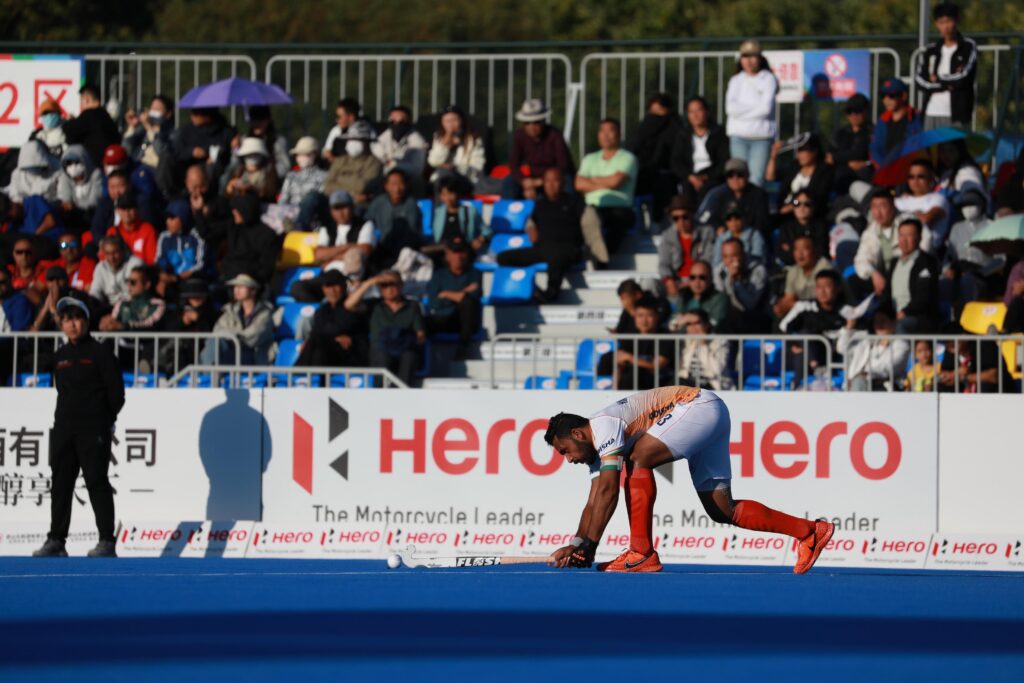
India were down by two goals, 1-3. And those were the eight minutes of hockey that I have ever witnessed in my sports-watching career which will never leave me. The man who is part of this podcast with me comes to the centre of the field and I am talking about Tokyo [2021], India versus Germany. He puts his hand up and calls all the players. The coach was outside and all the Indian players came in. Obviously, it’s in the middle of a game and he didn’t have more than 30 seconds. And there was something going on there.
Eight minutes [lter], India was up 5-3. He himself scored, put his hand up again, penalty-corner conversion. Since then, whatever has happened to Indian hockey is like a fairytale. A medal in Tokyo, a medal in Paris. And once again in Paris, the highest scorer for India, leading from the front. Captain Fantastic. Absolutely amazing.
Hum Log hockey jitna celebrate karte hai last 10 saal mein [However much we’ve celebrated hockey in the last ten years], Harmanpreet Singh is right up there in terms of his ability as a player, in terms of his ability as a leader. Thank you very much for joining me.
Boria: Back-to-back medals. Ab hockey India league (Now, Hockey India League). Sport theek thaak chal raha hai india mein [Is the sport going well in India]?
Harmanpreet: Not just that, I would say everything is going great, because of back-to-back [Olympic] medals, and after that, the resumption of Hockey India League. And it is a good sign because for the younger generation, our Hockey India League is such a platform from where we have grown, we have learnt. So, I think this is the right time, for the team does well and we have got to see all the youngsters in the Hockey India League who have gotten a chance to come to the camp. So, I think we can expect a good future for Indian hockey .
🚨 #HarmanpreetSingh Exclusive
“The tricolour means everything” — @TheHockeyIndia men’s captain @13harmanpreet.
Looking back at the Paris and Tokyo medals; playing 43 mins with 9 men against GBR in Paris; family time and backstage; being the most dangerous drag flicker and… pic.twitter.com/G2n52NpKq6
— RevSportz Global (@RevSportzGlobal) April 5, 2025
Boria: We have achieved back-to-back glory under your leadership. Be it the Asian Games gold, Asian Champions Trophy, Olympic medals. So now, the expectations must be very high. How do you see yourself as a leader? Talking about the match with Great Britain [Paris quarterfinal], Amit Rohidas’s red card and having to play 43 minutes with 10 to win the match. How can Harmanpreet Singh win that match? I asked Craig Fulton once if it was the toughest match ever. You tell me.
Harmanpreet: I agree with you 100 per cent. In today’s hockey, surviving 43 minutes with one less player is tough. That too against Great Britain, with such a good set of players, their body play, man-to-man marking, their toughness. But the way our team took initiative and stepped up to show our ability, both individually and collectively, was the main winning factor. We knew that it is going to be tough after the red card, but we had that trust in each other. We knew we have practiced for these situations. Finishing in a draw, fighting till the last whistle, winning it in the shootout, it was a big thing for us. It will always remain as the most memorable and best match of my life.
Boria: You are saying that you have practiced for these situations, but how could you have practiced for a red card? No, you cannot. This is such a rarity. How did you manage it?
Harmanpreet: The practice happens keeping such situations in mind. We know that whether you get a green card or a yellow card in a game, we have different plans and strategies for it, and that is what we have applied in that match. But yeah, to be honest, we never thought that we would have to survive for 43 minutes.
Boria: Nobody really thought of that?
Harmanpreet: I never thought of it. Of course, we have our share of practice, but maintaining the same structure for so long was not something even we expected. And after that, I think we also got a green card. I think there were 8 players on the field and a goalkeeper. So, it got very tough for us, but we kept motivating each other. Without the ball is a very important skill for our team and we communicate very well. With the ball, the players can take their own decisions, but without it, the defender is guiding the midfielder, the midfielder guiding the forward, the goalkeeper guiding the whole team. I think we managed that whole thing very effortlessly. I think we got a PC (penalty corner) and we had 1 battery [player at the top of the striking circle] and 1 stopper. Usually, we function with 2 batteries, so we had this mindset that even if we don’t get a goal ahead, we shouldn’t go one behind. We focused mostly on defence.
For More Sports Related Content Click Here

Boria: If I talk about PCs, then for so many years now, everyone knows that you are the most dangerous threat. So, when the opposition is also working on you, so many coaches are working, everything is evolving every day to stop you. Still, you keep scoring goals with an amazing consistency. What do you do?
Harmanpreet: I, on the other hand, keep focusing on how to prevent them from doing that. I keep observing how their rusher is running, the position of their goalkeeper and, of course, our coaches, staff, video analysts help us a lot in making us focus on every small thing. And when we study our opponents, we try to see who are the main rushers, if they are coming to block, who is double-rushing, where can we get the gap, what is the strong side of the goalkeeper and so on. We work on these things. There are a few changes when we discuss the variations. Because usually the ball comes straight, what we do is we add on to it. Like, if we have to beat the first rusher, we take a little step towards the left or little towards the right, so that it is difficult for him to change the angle. That is the way we practice.
Boria: I have seen a lot of your photos with family, and you look such a happy family together. So, what do you do at home? What do you eat? What is your favorite food? Where do you take holidays? And if you get time, what do you do the rest of the time?
Harmanpreet: I do get very little time with family, but in the break that I get after the camps, I try to spend as much time with them as possible. I have a daughter at home , she was looking out for me this morning as well when I was leaving. So, it’s all very tough, but as I said, I try to utilise whatever time I get, going for shopping or dinners together as a family.
Boria: I saw your wife’s photos in the India jersey, the ones that you posted. So, is she a great hockey fan, and does she follow all your games?
Harmanpreet: Yes, yes, definitely she does.
Boria: That does help in a way.
Harmanpreet: Yes, 100 per cent. She is very understanding and has been very supportive since day 1 of knowing each other. Whenever I get distracted, she is the one who makes me realise where the priority is and where do I need to focus more. Even when tough times come, she is always with me. I think I am very lucky.
Boria: How did you deal with the tough times during the [2023] World Cup?
Harmanpreet: It was very tough during that time. My wife, my mother and mother-in-law were there with me. Once, I broke down with them in front of me and wanted to not play anymore and give up. But the way they pushed and motivated me was very helpful. They made me realise that life is all about ups and downs but we need to take our lessons from them and keep going. These words really helped me. Also, my colleagues, they have helped me time and again.

Boria: You might will remember Trisha [Ghosal] and I were standing outside the stadium. You came out, Bhola ji (Bholanath Singh) was with us, and in the interview, he stated that “Harmanpreet is the captain of India till 2028 LA Olympics.” Captaincy is good, but with that comes responsibility, pressure, and everything. I mean, now that the bronze medal has been won twice, we will now say that you should change the colour of the medal. We put all the pressure on you. So, tell me, how do you deal with such pressure?
Harmanpreet: I don’t take it as a pressure. I take it as a responsibility. Even if no one tells me to achieve things, I’ll do it on my own. I have this mentality that even if we had got gold in Tokyo and Paris, we still would’ve gone to LA with the target of getting gold again. So, it remains the same for me. And especially, talking about Paris, the way we have played, we deserve that gold.
Boria: You think we could have won gold?
Harmanpreet: Yes, it was a very good chance for us with the way our team had performed throughout the tournament. Every player performed well and there was confidence in the team. And beating a team like Australia on such a big platform, competing against such tough teams. All these things gave us a lot of confidence.
Boria: Do you cheat on your meals? What do you like having? What is a cheat day for you like? How do you relax? Do you watch movies?
Harmanpreet: Cheat meal days are usually at home. I eat paranthas [stuffed flat bread] when its being made at home.
Boria: Which paranthas in particular do you like?
Harmanpreet: I like aloo [potato] paranthas, gobi [cauliflower] paranthas. One mostly only gets paranthas in Punjab. And I don’t enjoy sweets much, so I don’t eat them.
Boria: You are saved then. Do you like music? Reading? Watching TV?
Harmanpreet: Yes, sir I do like music. I do listen to music. I listen to Hindi and Punjabi music. I have a special love for music and I spent a lot of time with it.
Boria: Day in and day out, it’s very difficult to get up and chase excellence every day because when you win a medal, there is media glare and celebration. We all gather to celebrate. But the other side, when you have to wake up every day early morning and practice, no one‘s there, it’s only you and your hockey stick and your colleagues. It is the most difficult part and if you don’t do that, you don’t become a good player. So tell us a bit about that process. Tell us a bit about what if one wants to become a hockey player, the next Harmanpreet Singh. What is your suggestion for the kids who want to become you?
Harmanpreet: The journey is always very tough, no matter which part of it we are talking about. Definitely at the start, where people don’t have much knowledge and one has to follow the daily routine, so it becomes very boring. I think that’s one part where you have to focus on the basics with dedication and that is going to help you. So, it’s the same with me when I wake up in the morning. I have this mindset that I’ll have to do better than yesterday, be it conditioning, flicking, gym. I keep in mind that I’ll have to do, say, one extra rep at the gym today. One has to keep the dedication, hard work, discipline, no matter which sports they are associated with.

Boria: When I think of current Indian sportspeople, very few have achievements like yours.
Now, you have earned a lot of money, name, fame – you have achieved everything, as compared to Indian standards. Do you still feel that motivation? Raising the Indian tricolor, how does it feel for you, Harman?
Harmanpreet: Everything, sir. The very first day I received the junior’s team jersey, I still feel the same about wearing it. I am still proud that I got that opportunity, and whenever now during a major tournament, the Indian tricolour goes up and the national anthem plays, I am still getting goosebumps thinking about it. So, it’s a very special moment for me to represent the country and winning a medal for the country is always a great feeling. As long as I am playing, I would try that the Indian tricolour stays up and above always.
Boria: There’s only one last request to you. Please let the Indian tricolour stay up and let the national anthem play at the 2028 Olympic, in LA (Los Angeles).
Harmanpreet: Done, sir, Umeed karte hai [Hoping for the same].
Also Read: Harmanpreet’s commitment and sense of calm make him a natural Sarpanch



